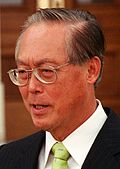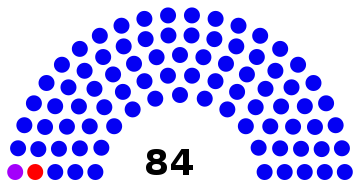Top Qs
Timeline
Chat
Perspective
2001 Singaporean general election
From Wikipedia, the free encyclopedia
Remove ads
General elections were held in Singapore on 3 November 2001. President S.R. Nathan dissolved parliament on 18 October 2001 on the advice of Prime Minister Goh Chok Tong. The ruling People's Action Party (PAP) won 82 of the 84 elected seats in Parliament in a landslide victory. This was the third consecutive election (and fourth overall) where the PAP returned to power on nomination day due to a majority of seats, 55 of them from ten Group Representation Constituencies, just one seat short from a supermajority, were elected via walkovers, being the most recent election on doing so. This is Goh Chok Tong's last election as Prime Minister before handing to Deputy Prime Minister Lee Hsien Loong.
This election marked the first time that total eligible voter population exceeded the 2 million mark, though only one third of them (675,306 of the 2,036,923 eligible voters) had an opportunity to vote. As of the recent election in 2025, this was the most recent general election to date where Workers' Party was not the forefront opposition party representing in the government.
Remove ads
Background
Summarize
Perspective
The ruling PAP's secretary-general and Prime Minister Goh Chok Tong initially scheduled for the election to be held in 2002, but pushed to November after Singapore faced an economic crisis due to the September 11 attacks in the United States; this election saw its shortest campaigning period of 17 days after opening of the register of electors, due to the aftereffects of the September 11 attacks and Goh sought to secure a mandate as fast as possible. The election deposit saw one of the significant increases in history, upping it by $5,000 to $13,000.
The Singapore Democratic Party (SDP) fielded 11 candidates contesting in three constituencies. Leader Chee Soon Juan and his sister Siok Chin leaded their team in the newly formed Jurong GRC, while former MPs Cheo Chai Chen and Ling How Doong respectively challenged Hong Kah GRC and Nee Soon Central SMC.
Former Workers' Party (WP) Non-Constituency Member of Parliament Joshua Benjamin Jeyaretnam, who lost his seat after being declared a bankrupt owing to lawsuits by PAP leaders, resigned from the party, citing disagreements with the present leadership. The only WP Member of Parliament, Low Thia Khiang took over as secretary-general. During nomination day, WP was nominated on only two wards (Hougang and Nee Soon East SMC), as their GRC team who attempt to nominate in Aljunied Group Representation Constituency (which were chairman Tan Bin Seng, second vice-chairman Huang Seow Kwang (both previously contested Cheng San GRC in 1997), and new members Abdul Rahim Abdul Rahman, James Gomez and Yaw Shin Leong)[1] was disqualified for filing incomplete papers, while bids to contest Ang Mo Kio, East Coast and Pasir Ris-Punggol Group Representation Constituencies were later withdrawn as their party did not show up on their respective nomination centres. Low cited that their disqualification was an "oversight" and later took responsibility for it.[2]
For the first time since 1963, a formal political umbrella emerged from within the opposition. The four-party Singapore Democratic Alliance (SDA), which consist of the leader party Singapore People's Party (SPP), the National Solidarity Party (NSP), Pertubuhan Kebangsaan Melayu Singapura (PKMS) and Singapore Justice Party (SJP), was led by Chiam See Tong. SDA fielded 13 candidates in the election, where NSP provided the bulk of nine candidates, SPP with four, and PKMS providing a required minority candidate. All but one of the contests were straight fights, with the exception being Bukit Timah SMC which saw its sole three-cornered contest between them and an independent this election. According to SDA, four other opposition parties, including SDP and WP, had turned down the invitation. The rest were the Democratic Progressive Party (DPP) and Singapore National Front (SNF), the latter who had yet to contest an election after its founding in 1991.
A seat had been vacated in 1999 after the conviction of Jalan Besar GRC's MP Choo Wee Khiang over commercial crimes, but no by-election was held as the seat was within a GRC. Under the law, an entire electoral constituency (for both single member and GRC seats) has to be vacated before a by-election could be called, as this was done during the Marine Parade GRC by-election of 1992.
Remove ads
Timeline
Electoral boundaries
Summarize
Perspective
The Publication of Electoral Boundaries report for the 2001 election was released on 17 October 2001, the day prior to the current parliament's dissolution. The 10th Parliament will return 84 seats, with nine SMCs, nine five-member GRCs and five six-member GRCs; all the four-member GRCs were eliminated (four-member GRCs did not reappear until the next two election cycles). The election saw the introductions of Holland–Bukit Panjang GRC (later renamed to Holland-Bukit Timah GRC in the next election), Jurong GRC (which was retooled from most of the Bukit Timah GRC while Bukit Timah being changed back to a SMC) and Pasir Ris-Punggol GRC (renamed from Pasir Ris GRC while incorporating the Punggol and Sengkang town areas from Cheng San GRC). Bukit Timah, Cheng San and Kreta Ayer-Tanglin GRCs were dissolved and reorganized into different constituencies. The SMCs of Bukit Timah and Joo Chiat were returned, while Boon Lay, Bukit Gombak and Kampong Glam were subsumed into GRCs.
For the first time ever, some group representation constituencies kept their status quo from the last election, meaning that the boundaries for these wards are left untouched (in this case, Bishan-Toa Payoh and Marine Parade), a recurring feature seen in every succeeding general election.
Remove ads
Outgoing/New MPs
Summarize
Perspective
There were a total of 40 (25 PAP) candidates making their political debut in the 2001 election. Notable figures were Tharman Shanmugaratnam and Halimah Yacob, both of which would later go on to become Presidents of Singapore. 24 incumbent MPs retired prior to the announcements. 15 candidates outside PAP were also new, among which new faces include Chee Siok Chin, sister of the SDP's leader Chee Soon Juan, as well as Desmond Lim, who would later lead the newly formed SDA in future years, and a future Perennial candidate Ooi Boon Ewe.
| New candidates | Outgoing MPs |
|
|
- ^ Richard Hu initially announced that he would seek another term in leading a team for the new Holland–Bukit Panjang GRC, but the idea was scrapped and was replaced by Gan Kim Yong.
Remove ads
Results
Summarize
Perspective
PAP won a landslide with its best result since 1980, achieving its third highest score among the general elections it has contested since 1959. The PAP's vote percentage of 75.3% signaled an overwhelming endorsement of the PAP to lead the nation out of the crisis that came at a time of great uncertainty over world security and the recession that came after the September 11 attacks. Notably, Chong Weng Chiew and Penny Low became the first two MPs to be born in post-independent Singapore.
Both opposition-held wards were successfully retained but saw their winning margins reduced. With these two opposition wins, one NCMP seat was offered to and accepted by Steve Chia of Singapore Democratic Alliance, who became the first NCMP who was not from the Workers' Party.
Two candidates, Tan Kim Chuang and Tan Lead Shake, had each forfeited their $13,000 election deposit, the latter being a straight contest where Tan Cheng Bock won the best performing election result at 87.96% in Ayer Rajah Constituency; This is the last election to date where there was a forfeiture of election deposit outside multi-cornered contests. It was also the last election until 2025 where PAP had a constituency scoring above 80%.[3]
Popular vote
- PAP (75.3%)
- SDA (12.0%)
- SDP (8.09%)
- Workers' (3.05%)
- Others (1.53%)
Seats won
- 55 seats (PAP; uncontested) (65.5%)
- 27 seats (PAP; contested) (32.1%)
- 1 seat (SDA) (1.19%)
- 1 seat (Workers') (1.19%)
By constituency
Remove ads
Aftermath
Summarize
Perspective
Chee Soon Juan incident
Singapore Democratic Party (SDP) leader Chee Soon Juan came under fire in the media when he encountered Prime Minister Goh while campaigning at a hawker centre. He used a megaphone to ask Goh, "Where is the $18 billion that you have lent to (then-Indonesian President) Suharto?". Goh and Senior Minister Lee Kuan Yew sued Chee for defamation shortly after the election.
Chee lost the lawsuits and was ordered to pay damages of S$300,000 to Goh and S$200,000 to Lee. Ahead of the 2006 elections, Chee was declared bankrupt on 10 February, making him ineligible from standing in elections. Chee would return again in the 2015 elections after being discharged from bankruptcy on 23 November 2012.
DPP's hiatus
Following the election, on July 2002, DPP announced that they have expelled Tan Soo Phuan and his son Lead Shake from the party after they breached their orders. Soo Phuan did not inform his decision to contest MacPherson SMC, while Lead Shake contested Ayer Rajah SMC instead of Joo Chiat SMC.[4] DPP went dormant following their expulsion, but after a decade in December 2012, Singapore People's Party revived the party, which include Benjamin Pwee and Mohamad Hamim bin Aliyas.[5]
Remove ads
Notes
- Elected as NCMP on 5 November 2001.
References
External links
Wikiwand - on
Seamless Wikipedia browsing. On steroids.
Remove ads





